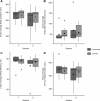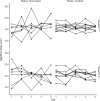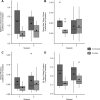Sleep Quantity and Quality during Acute Concussion: A Pilot Study
- PMID: 27748242
- PMCID: PMC5103802
- DOI: 10.5665/sleep.6314
Sleep Quantity and Quality during Acute Concussion: A Pilot Study
Abstract
Study objectives: A number of subjective and objective studies provide compelling evidence of chronic post-concussion changes in sleep, yet very little is known about the acute effects of concussion on sleep quality and quantity. Therefore, the purpose of this prospective pilot study was to use actigraphy to examine the changes in sleep quality and quantity acutely following concussion at home rather than in a hospital or sleep laboratory.
Methods: Seventeen young adults (7 with acute concussion, 10 controls) were recruited for this study. All participants completed two 5-day testing sessions separated by 30 days from intake (controls) or day of injury (concussion). Participants wore actigraphs and kept a sleep journal. Sleep parameter outcomes included nighttime total sleep time (nTST), 24-h total sleep time (TST), wake after sleep onset (WASO), and sleep efficiency (SE). The coefficient of variation (CV) for each sleep parameter was computed for each session.
Results: nTST and TST CV was significantly greater in the concussion group. There is the additional indication that individuals with a concussion may require and obtain more sleep shortly after injury and subsequently have a shorter duration of sleep at 1 mo post-injury. This pattern was not seen in the measures of sleep quality (WASO, SE).
Conclusions: Individuals with a concussion demonstrated increased nighttime sleep duration variability. This increase persisted at 1 mo post-injury and may be associated with previously documented self-reports of poor sleep quality lasting months and years after a concussion. Additionally, this increase may predispose individuals to numerous negative health outcomes if left untreated.
Keywords: actigraph; concussion; sleep duration; sleep quality.
© 2016 Associated Professional Sleep Societies, LLC.
Figures



Similar articles
-
Concussion and the Sleeping Brain.Sports Med Open. 2024 Jun 9;10(1):68. doi: 10.1186/s40798-024-00736-2. Sports Med Open. 2024. PMID: 38853235 Free PMC article. Review.
-
Relationships between Post-Concussion Sleep and Symptom Recovery: A Preliminary Study.J Neurotrauma. 2020 Apr 15;37(8):1029-1036. doi: 10.1089/neu.2019.6761. Epub 2019 Dec 26. J Neurotrauma. 2020. PMID: 31774024
-
Differences in sleep between concussed and nonconcussed college students: a matched case-control study.Sleep. 2019 Feb 1;42(2). doi: 10.1093/sleep/zsy222. Sleep. 2019. PMID: 30452734
-
Examining the trajectory and predictors of post-concussion sleep quality in children and adolescents.Brain Inj. 2022 Jan 28;36(2):166-174. doi: 10.1080/02699052.2022.2043439. Epub 2022 Feb 25. Brain Inj. 2022. PMID: 35213283
-
Actigraphic and patient and family reported sleep outcomes in children and youth with cystic fibrosis: A systematic review.J Cyst Fibros. 2022 Mar;21(2):e49-e82. doi: 10.1016/j.jcf.2021.05.005. Epub 2021 May 24. J Cyst Fibros. 2022. PMID: 34039530 Review.
Cited by
-
Early physical activity and clinical outcomes following pediatric sport-related concussion.J Clin Transl Res. 2020 Apr 16;5(4):161-168. eCollection 2020 May 26. J Clin Transl Res. 2020. PMID: 33029564 Free PMC article.
-
Concussion and the Sleeping Brain.Sports Med Open. 2024 Jun 9;10(1):68. doi: 10.1186/s40798-024-00736-2. Sports Med Open. 2024. PMID: 38853235 Free PMC article. Review.
-
Insomnia and daytime sleepiness: risk factors for sports-related concussion.Sleep Med. 2019 Jun;58:66-74. doi: 10.1016/j.sleep.2019.03.008. Epub 2019 Mar 25. Sleep Med. 2019. PMID: 31132574 Free PMC article.
-
Lived Experiences of Adolescent Athletes Following Sport-Related Concussion.Orthop J Sports Med. 2017 Dec 11;5(12):2325967117745033. doi: 10.1177/2325967117745033. eCollection 2017 Dec. Orthop J Sports Med. 2017. PMID: 29276716 Free PMC article.
-
Pharmacological and physiological effects of cannabidiol: a dose escalation, placebo washout study protocol.BMC Neurol. 2024 Sep 12;24(1):340. doi: 10.1186/s12883-024-03847-1. BMC Neurol. 2024. PMID: 39266961 Free PMC article.
References
-
- Dijk D-J, Duffy JF, Czeisler CA. Circadian and sleep/wake dependent aspects of subjective alertness and cognitive performance. J Sleep Res. 1992;1:112–7. - PubMed
-
- Pilcher JJ, Walters AS. How sleep deprivation affects psychological variables related to college students' cognitive performance. J Am Coll Health. 1997;46:121–6. - PubMed
-
- Thomas M, Sing H, Belenky G, et al. Neural basis of alertness and cognitive performance impairments during sleepiness. I. Effects of 24 h of sleep deprivation on waking human regional brain activity. J Sleep Res. 2000;9:335–52. - PubMed
-
- Reilly T, Edwards B. Altered sleep-wake cycles and physical performance in athletes. Physiol Behav. 2007;90:274–84. - PubMed
-
- Chiu H-Y, Chen P-Y, Chen N-H, Chuang L-P, Tsai P-S. Trajectories of sleep changes during the acute phase of traumatic brain injury: a 7-day actigraphy study. J Formos Med Assoc. 2013;112:545–53. - PubMed
MeSH terms
LinkOut - more resources
Full Text Sources
Other Literature Sources
Medical

